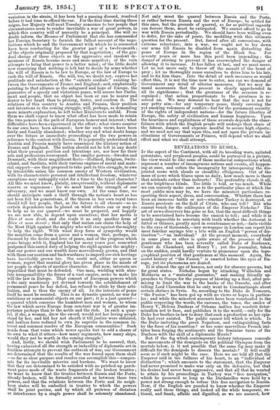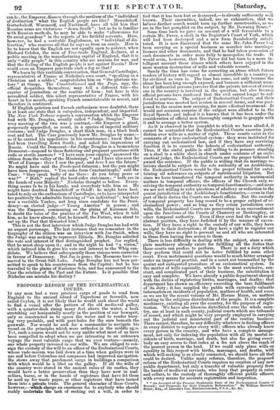REVELATIONS TO RUSSIA.
IF the aspect of the Continent, with all its brooding wars, agitated potentates, and perplexed peoples, could be portrayed in a picture, the view would be like some of those mediseval compositions which represent a number of incongruous actions and events, all happen- ing at once, and soften the incongruity by interspersing the dis- jointed scene with clouds or cloudlike effulgences. Out of the mass of news which blazes upon us daily, how much more is there that misleads rather than instructs ! The profundity clouds it all, or the brightness blinds. Too little is told, or too much. While we can scarcely make sure as to the particular place at which the most public men may be, we have the minutest particulars re- specting their aspect, dress, and conversation. Whether there has been an immense battle or not—whether Turkey is destroyed, or Russia prostrate on the field of Citate, who can tell ? But who cannot vouch for the soliloquies of the Emperor Nicholas? The art of news-discovery has gone so far, that the most difficult things to be ascertained have become the easiest to tell; and while it is nearly impossible to ascertain with truth whether the Autocrat is fatter or thinner, greatly aged in countenance or not,—facts visible to the eyes of thousands,—any newspaper in London can report his most familiar sayings tete a tete with an English "person of dis- tinction"—" an individual." At the present moment, everybody in some place or other is quite aware of the presence of that gentleman who has been severally called Duke of Bordeaux, Count de Chambord, and Henry Y; yet the journalist, taken on the sudden, could hardly venture to pronounce upon the topo- graphical position of that gentleman at this moment. Again, the secret history of "the Fusion" is enacted before the eyes of Eu- rope, yet its phenomena are denied. It is almost the age of hoaxes, not only for obscure persons, but for great states. Nicholas began by attacking Wallachia and Moldavia as a "material guarantee," and making friendly ap- proaches to Sinope for the purpose of blowing up a fleet, after pro- mising to limit the war to the banks of the Danube, and after telling Lord Clarendon that he only went to Constantinople about certain shrines in Syria. So, according to the Duke de Nemours, "the Fusion" has been got up with no views or hopes in particu- lar; and while the minutest accounts have been vouchsafed to the public respecting the words, the caresses, the tones, the smiles of Henry V, Helena Duchess of Orleans indites her resolute deter- mination not to fuse, and publishes it to the world,—only for the
Duke her brother-in-law to deny that such a production as her epis- tle had ever existed. The public cannot tell which is which. Is
the Duke imitating the great Napoleon, and extinguishing facts by the force of his assertion P or has some marvellous French imi- tator been forging the sentiments and the feminine turns of the Duchess with the skill of a diplomatic Mceris?
But if the fog which contemporary history interposes conceals the movements of the demigods on the political Olympus from the mortals below, is 'it not possible that the same fog may make it difficult for the demigods to discern the mortals? It will real
seem as if such might be the case. Here we are told all that the Emperor said in the fullness of his heart, to an "individual of distinction" ; which amounts to the statement, that the Emperor had never promised to make war only on the defensive, but that his desires had never been aggressive, and that all that he wanted to attain by his proceedings in Turkey was "free navigation," which he possessed so long as the Dardanelles were held by a power not strong enough to refuse this free navigation to Russia. Now, if the English are puzzled to know whether the Emperor really said these things, and looked all the while temperate, ra- tional, and frank, affable and dignified, as we are assured, how can he, the Emperor, discern through the medium of the "individual of distinction" what the English people are litre ? Menschikoff, Gortschakoff, Woronzoff, and Nachimoff, have all told him that Russian arms are victorious "down South" ; but as he is familiar with Russian methods, he may be able to make "allowances for Or ental grandeur" in the reports of his faithful servants. Here, however, he had a veritable Englishman, an "individual of dis- tinction," who receives all that he says as from an oracle. How is he to know that the English are not equally open to palaver, when Richard Cobden, the man of Free-trade England, declares, at a public meeting in the manufacturing capital of England, that it is only "silly people" in this country who are anxious for war, and that the feeling of the English people is not against Russia? How could even an Emperor penetrate such a fog as that? We learn by this veritable conversation, that General Castelbajae, representative of France at Nicholas's own court, "speaking as a Christian and a soldier," congratulates him on "the glorious vic- tory" at Sinope. The Constitutionnet and the Pays, nay, the official despatches themselves, may tell a different tale—the caprice of journalism or the routine of form ; but here is this accredited soldier, this select representative of France, with his heart in his mouth, speaking French unmistakeable in accent, and therefore in sentiment.
If English quietism and French enthusiasm were doubtful, there is at least one state that is outspoken, independent, and impartial. The New York Tribune reports a conversation which the Emperor had with Mr. Douglas, usually called "Judge Douglas." The very meeting of the two was a contrast,—the Emperor a giant, gorgeously apparelled, as usual, in a species of imperial military costume ; and Judge Douglas, a short thick man, in a black frock coat and hat. The Czar graciously knew Mr. Douglas by name— as if he carried his appellative in his countenance ; knew that he had been travelling down South ; and asked his impressions of Russia. Could the Democrat—for Judge Douglas is a tremendous Democrat—respond to these flattering and pregnant questions with rude or sterile answers? "I have seen your empire," answered the citizen from the valley of the Mississippi, "and I have also seen the West of Europe : there I saw the past, and here I see the future." He might have said the Paulo-post-faun= ; but the pun might have been dangerous. "You come from Constantinople," said the Czar : "they speak badly of me there : do you bring peace or war?" "Both," replied the hard-cider statesman ; "both are in the hands of your Majesty." Nicholas thought so before. Every- thing seems to be in his hands, and everybody tells him so. He might have doubted Menschikoff or Orloff; he might have hesi- tated to rely on the enthusiasm of Castelbajac, or to have interpreted too positively the admirable listening of "an individual"; but here was a veritable Yankee, not long since candidate for the Presi- deneyL—an elected judge—" Young America" in person ; and was the Emperor, communing on the plains of Karasnoe Selo, to doubt the voice of the prairies of the Far West, when it told him, as he knew already, that he himself, the Future, was about to eat up the Past that thwarted him ? This is not the first interview which Judge Douglas has had with an august personage. The last instance that we remember in the biography of the eitizen was an interview with Joe Smith, when the Judge was seeking to represent Illinois. Mr. Douglas solicited the vote and interest of that distinguished prophet. • Joe replied, that he must sleep upon it; and in the night he had "a vision," -which induced him to give his vote and interest to the Whig can- didate. We believe that subsequently those visions were corrected in favour of Democracy. But Joe is gone ; the Mormons have re- moved to the Great Salt Lake. Judge Douglas has not been per- mitted to speak to his countrymen from the Capitol ; but he has travelled to the plains of Karasnoe Selo, and has announced to the Czar the relation of the Past and the Future. Is it possible that Nicholas can mistake his destiny ?































 Previous page
Previous page